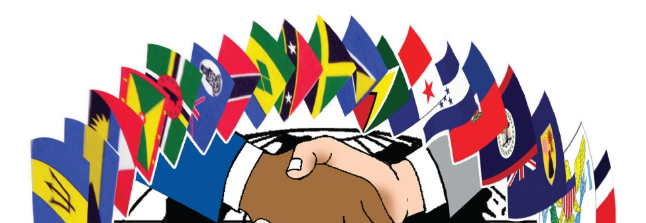I was recently having a conversation with some friends from the Caribbean, and the topic of brain drain arose. We were all university graduates who had migrated from the Caribbean, now living in Canada, with strong connections to our respective islands and a desire to make a difference in those islands. This started us thinking; why aren’t Caribbean countries tapping into the nationals living in different parts of the world? Many are willing to make a contribution of some sort to the development of their country and engaging them could lead to the much needed economic growth in many countries. At the end of the night, my partner and Non-profit professional Trisha Mitchell-Darius (@mztrisham) who had started an informal mapping of the Grenadian Diaspora decided to collaborate on some more research in this area, below are our preliminary findings. We hope this will be the beginning of a series of discussions on this critical area of development for Caribbean nations.
The Caribbean diaspora is a sizeable, well-educated, and affluent demographic whose large majority is interested in investing in its countries of origin. Due to the common heritage and strong connections across the region, they overwhelmingly take a regional approach to the Caribbean, rather than a nationalistic one. Supported by the right incentives and policies, diaspora members could play an even larger role in contributing to the region’s development.
According to a 2013 world bank report, The Caribbean diaspora is already significantly engaged in the region, with some 70 percent being formal or informally affiliated with organizations in their home countries. Half of those surveyed send remittances, and a full 85 percent give back to the Caribbean either through financial help, or other support in kind. Moreover, nine out of ten would like to be even more engaged in the future, potentially as investors. With nearly one diaspora member living in North America or Europe for every resident still in the region, this ability to engage represents a significant untapped potential.
This report also indicated that diaspora members are willing and prepared to contribute through investments in business ventures back home. According to this same report, diaspora members are most willing to make investments in startups, whether these are small and medium-sized enterprise or public corporations.
For companies and entrepreneurs in the Caribbean looking to expand into global markets, both physically and for international trade, these defined diaspora communities with homeland ties offer an untapped source of revenue. The next logical question therefore is; how can companies access and take advantage of this market? The answer? Targeting the right immigrant, where diaspora marketing is concerned, it’s important to understand there are four types of immigrants.
1- Assimilators– These are the immigrants that are unlikely to retain the practices cultures and values of their country. They adopt those of the country they move to, and the are more than likely not going to buy products from their home country.
2- Marginals– These are the immigrants that believe that the society they have moved to has in some way shape of form marginalized them, especially if they were forced to leave their homelands. I don’t know of anyone being forced to leave the Caribbean, but it happens elsewhere. These people are generally poor both at home and in the country they moved to and lack economic opportunities.
3- Ethnic Affirmers– These people make a conscious effort to separate themselves from the lifestyle, culture, values, even brand, and products of their host country. They cling to their home culture as a means of retaining their identity.
4- Biculturals– These people have a sense of belonging to their home and host country without compromising their identity, kind of like me. They can adapt their behaviors to fit the context; they can use elements of both culture in their behaviors.
A Harvard business review article highlight four questions that marketers must ask if they are going to market to the diaspora.
1– Does their brand have a universal appeal?– at the end of the day, even though you will be targeting nationals from your country, the brands need to be universal.
2- Is the diaspora large enough?– First of all, Caribbean companies need to figure out where the ethnic affirmers and the biculturals are located and see whether the market there is big enough to target.
3- Will the diaspora’s distribution allow the brand to expand nationally?– The diaspora should be all over a country, but with a concentration in some key areas, these concentrated groups act as a stepping stone for the brand to go national.
4- Will the diaspora’s socioeconomic profile help the brand?– The question here is whether the profile of the members of the diaspora resembles that of the members of the host country. People tend to bond with people who are like them. If locals can’t identify with the ethnic consumers of an imported brand they may not consume its products. So, if you can identify with Grenadians, you will more than likely buy Grenadian products.

Another area of interest is diaspora philanthropy; here we define philanthropy as major individual formal, institutional and strategic giving for a particular cause. Traditionally the Caribbean diaspora has largely been involved in informal philanthropy via family remittances, e.g., Barrels and money transfers and localized support of community projects, e.g., Churches and schools. This does not negate the significance of this contribution, and Caribbean governments are beginning to take note. Although there is little research on the role of these remittances in philanthropic giving in the Caribbean, these funds may represent an opportunity to engage donors in giving more strategically to the region. To date, several islands, e.g., Jamaica Diaspora Conference – 2006, Grenada Diaspora Conference – 2011; have made attempts to find strategies to engage their diaspora with varying degrees of success. This area is still, however, largely under-researched despite the strong tradition of giving in the Caribbean and its obvious potential for economic benefit. It remains to be seen if a version of the organized North American non-profit sector with its formal giving structures can be adapted to suit the region.
With over three million people of Caribbean descent in the U.S alone, there is a need for a coordinated effort to unleash the full power of the diaspora for building both within and outside the Caribbean to better serve its population.


Being a Grenadian living in Southern California, I find it challenging to connect with my countrymen. Many are residing on the East Coast and the few I managed to run into are simply passing through, or too “busy” doing their own thing. I’ve sent emails to the Grenadian embassy in Washington seeing if they can make recommendations, however, they seem to be on Caribbean time and reluctant to do anything not included in their 9 – 5 job description. Hence, I feel like I am the lone Grenadian living on the West Coast.